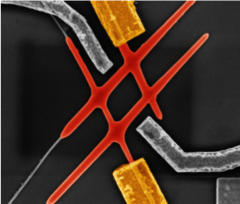Delft affair does not affect Eindhoven's quantum computer
A damper has been put on quantum computing research: it appears that Full Professor Leo Kouwenhoven and his team at Delft have not, after all, delivered hard evidence for the existence of what are known as 'Majorana particles', regarded as promising building blocks for quantum computers. The nanowires in which the Majorana particles were believed to have been present come from the lab of Full Professor Erik Bakkers at TU/e. Nonetheless, Eindhoven-based research on quantum computers is not directly affected in the affair, says Servaas Kokkelmans, director of the Center for Quantum Materials and Technology (QT/e).
Over the past week it has been big news, in the Volkskrant and NRC national newspapers and elsewhere: Kouwenhoven and his team were reported to be retracting their 2018 article in Nature in which they presented evidence for the existence of Majorana particles in quantum structures in the form of a hashtag (#). After doubts about the validity of this evidence surfaced back in April 2020, in a new article - published on the open-access preprint server ArXiv - the researchers state that following a new analysis of the raw data they can no longer claim to have actually observed Majorana particles.

This conclusion is at least partially due to new insights in the field, but it may also be that the selection made from the raw data was less than careful. The latter possibility has prompted TU Delft to start an integrity review of Kouwenhoven and his postdoc Hao Zhang, first author of the 2018 article.
Working with his own team, TU/e Full Professor of Advanced Nanomaterials & Devices Erik Bakkers was responsible for producing the nanowires for the nano-hastags mentioned above and is therefore co-author of both the article in Nature and the publication on ArXiv. However, at the present time, he reports that he is unable to discuss the matter due to the above-mentioned integrity review.
Cold atoms
At TU/e researchers are also working on a quantum computer. Just a week ago Cursor reported about the coming of a brand-new laboratory, partly underground, where in 2024 a hybrid quantum computer will be ready for use. Director Servaas Kokkelmans of the Center for Quantum Materials and Technology (QT/e) runs this project and is noticing that the Delft affair is raising questions about the likely impact on Eindhoven's research into quantum computers.
He says the matter has no direct effect on QT/e and explains that TU/e collaborates within Quantum Delta NL, in which five quantum technology hubs in the Netherlands are affiliated. Besides QT/e, members include QuTech at TU Delft and TNO. “But the research on Majoranas is not being conducted under the umbrella of Quantum Delta NL; it is entirely a Microsoft Delft endeavor.” Four years ago Kouwenhoven joined Microsoft, which saw potential in quantum computers based on Majorana particles. After taking this step, Kouwenhoven maintained his connection with TU Delft.
The quantum computer planned in Eindhoven is based on ultracold atoms, captured in laser light that acts as a sort of optical tweezer. This technology, says Kokkelmans, is much further advanced than the research on Majoranas. “In order to get funding, Majorana research is always hyped as being for quantum computing, but they have never been able to demonstrate a quantum bit.”


Discussion